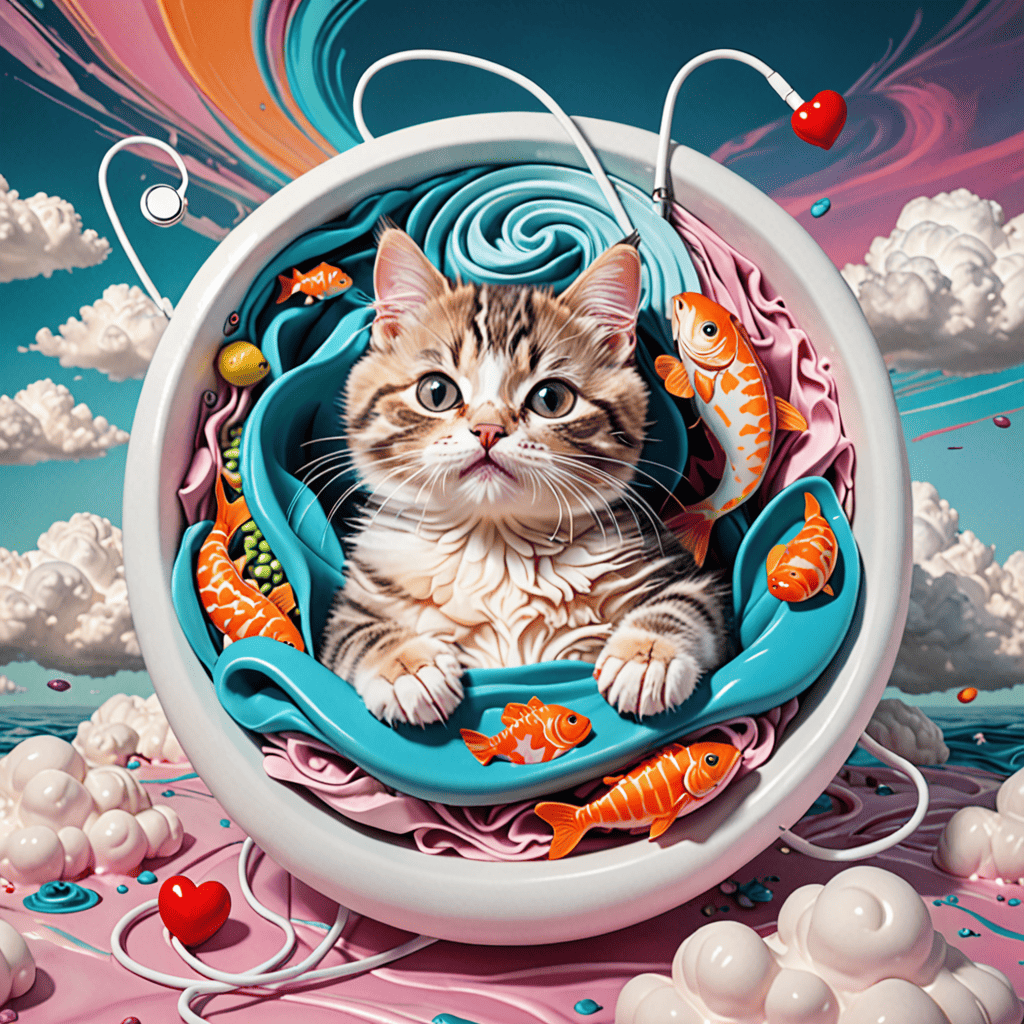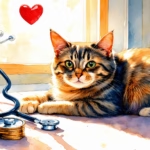When it comes to caring for a bloated kitten, understanding the causes and symptoms is crucial for any pet owner. A bloated belly can indicate various health issues, and recognizing the signs early can make a significant difference in your kitten’s well-being. In this article, we will explore essential remedies and insights on how to help your bloated kitten, including common home remedies and effective techniques for relieving gas. We will also discuss how to differentiate between a normal belly and a bloated stomach, the common causes of bloating in young kittens, and when puffiness may signal a more serious concern. By the end of this guide, you’ll be equipped with the knowledge to manage your kitten’s health effectively and know when to seek professional help. Join us as we delve into the important aspects of caring for your furry friend and ensuring their comfort and health.
How can I help my bloated kitten?
Understanding the Importance of Immediate Care for a Bloated Kitten
When you notice that your kitten is bloated, it’s essential to act quickly. A bloated kitten can experience discomfort and pain, which may lead to more severe health issues if not addressed promptly. Immediate care is crucial because bloating can be a symptom of various underlying problems, including gastrointestinal blockages, infections, or dietary intolerances. By recognizing the signs early and implementing effective strategies, you can help alleviate your kitten’s discomfort and promote better health.
Common Home Remedies for a Bloated Kitten
There are several effective home remedies you can try to help your bloated kitten feel better:
- Adjust Diet: Ensure you are feeding your kitten high-quality, species-appropriate food. Cats are obligate carnivores, and their diet should primarily consist of protein-rich wet food rather than dry kibble, which can contribute to bloating. Look for brands that list meat as the first ingredient and avoid fillers like corn and soy. According to a study published in the Journal of Feline Medicine and Surgery, a diet rich in moisture can aid digestion and reduce bloating.
- Encourage Hydration: Providing fresh, clean water is essential for your kitten’s health. Consider investing in a pet water fountain, as many cats prefer drinking running water over stagnant water in a bowl. This can help increase their water intake, which is crucial for digestion and overall health. The American Animal Hospital Association recommends ensuring your pet stays hydrated to prevent gastrointestinal issues.
- Monitor Feeding Habits: Feed your kitten smaller, more frequent meals throughout the day instead of one or two large meals. This can help prevent overeating and reduce the risk of bloating. The Veterinary Clinics of North America suggest that portion control is vital in managing a kitten’s digestive health.
- Provide Multiple Litter Boxes: Ensure that your kitten has access to multiple clean litter boxes. This can help reduce stress and encourage regular bathroom habits, which is important for digestive health. The ASPCA recommends having one more litter box than the number of cats in the household.
- Consult a Veterinarian: If your kitten’s bloating persists or is accompanied by other symptoms such as vomiting, lethargy, or diarrhea, it is crucial to consult a veterinarian. They can rule out any underlying health issues, such as gastrointestinal parasites or food intolerances, that may be causing the bloating.
By following these steps, you can help alleviate your kitten’s bloating and promote better digestive health. For more personalized advice, consider reaching out to a wellness coach specializing in pet health, as they can provide tailored strategies to improve your kitten’s overall well-being.

How to Tell if Your Kitten’s Belly is Bloated or Just Normal
Determining whether your kitten’s belly is bloated or simply normal can be crucial for their health. It’s essential to observe specific signs and symptoms that can help you make this distinction.
Signs of a Bloated Kitten: Key Indicators to Watch For
To determine if your kitten’s belly is bloated or just normal, observe the following signs and symptoms:
- Physical Appearance: A bloated belly will appear swollen and may protrude significantly beyond the normal outline of your kitten’s body. Compare the size of the abdomen to the rest of the body; if it seems disproportionately large, this could indicate bloating.
- Touch Sensitivity: Gently palpate your kitten’s abdomen. A bloated belly may feel firm or tense, whereas a normal belly should feel softer and more pliable. If your kitten reacts with discomfort or pain when you touch their belly, this is a concerning sign.
- Behavioral Changes: Monitor your kitten’s behavior. Signs of distress such as lethargy, loss of appetite, or excessive grooming of the abdomen can indicate a problem. A healthy kitten is typically playful and active.
- Breathing Patterns: Observe your kitten’s breathing. Rapid or labored breathing can accompany abdominal bloating and may signal a serious condition requiring immediate veterinary attention.
- Other Symptoms: Look for additional symptoms such as vomiting, diarrhea, or constipation. These can accompany bloating and may indicate underlying health issues.
If you suspect your kitten is bloated, it is crucial to consult a veterinarian promptly. Bloating can be a sign of serious conditions such as gastrointestinal obstruction, which can be life-threatening if not treated quickly (American Veterinary Medical Association, 2021).
Differentiating Between a Normal Belly and a Bloated Stomach
Understanding the differences between a normal belly and a bloated stomach is vital for your kitten’s health. Here are some key factors to consider:
- Size Comparison: A normal kitten belly should be proportionate to their body size. If the abdomen appears excessively large or distended, it may indicate bloating.
- Consistency: A healthy kitten’s belly should feel soft and flexible. In contrast, a bloated belly may feel hard or tense, indicating potential issues.
- Behavioral Indicators: Healthy kittens are typically active and playful. If your kitten is unusually quiet or shows signs of discomfort, it may be a sign of bloating.
- Feeding Habits: Monitor your kitten’s eating patterns. A sudden change in appetite, especially a refusal to eat, can be a warning sign of bloating or other health concerns.
For further insights on maintaining your kitten’s health, explore resources on kitten worm treatment and healthy kitten formula review.
Why is my 2 month old kitten bloated?
Understanding the reasons behind a bloated kitten is crucial for ensuring their health and well-being. Bloating in young kittens can be alarming, but identifying the underlying causes can help you take appropriate action.
Common Causes of Bloating in Young Kittens
Several factors can contribute to a bloated kitten, especially in those as young as two months:
- Excess Gas: Kittens can develop bloating due to the accumulation of gas in their gastrointestinal tract. This can occur from swallowing air while eating or drinking too quickly or from the fermentation of undigested food.
- Constipation: Constipation is another common issue in young kittens, leading to a buildup of stool in the intestines. This can cause discomfort and visible bloating. Signs of constipation include infrequent bowel movements and straining during defecation.
- Parasites: Intestinal parasites, such as roundworms or giardia, can lead to bloating and abdominal discomfort. Kittens are particularly susceptible to these parasites, which can cause gastrointestinal disturbances.
- Dietary Issues: An inappropriate diet, such as sudden changes in food or low-quality kitten food, can lead to digestive upset and bloating. It’s essential to provide a balanced diet formulated for kittens to support their growth and digestive health.
- Infections or Illness: Bloating can also be a symptom of underlying health issues, including infections or gastrointestinal diseases. If the bloating is accompanied by other symptoms like vomiting, diarrhea, or lethargy, it’s crucial to consult a veterinarian.
Health Risks Associated with a Bloated Kitten
While occasional bloating may not be a cause for alarm, persistent or severe bloating can pose significant health risks:
- Discomfort and Pain: A bloated kitten may experience significant discomfort, leading to changes in behavior, such as hiding or decreased activity.
- Dehydration: If bloating is due to constipation or dietary issues, your kitten may not be drinking enough water, leading to dehydration.
- Serious Health Conditions: Bloating can indicate more severe health problems, such as gastrointestinal blockages or infections, which require immediate veterinary attention.
- Growth and Development Issues: Ongoing digestive problems can hinder your kitten’s growth and overall health, making it essential to address any bloating promptly.
For more detailed guidance on kitten care and health, consider resources from reputable organizations such as the ASPCA and PetMD.
Why is my kitten puffy?
Understanding why your kitten appears puffy is crucial for ensuring their health and well-being. Puffiness in kittens can be a normal behavior or a sign of underlying issues. It’s essential to recognize when to be concerned and how to address potential health problems.
Understanding Puffiness in Kittens: When to Be Concerned
Kittens puff up for several reasons, primarily as a defensive mechanism. When a kitten feels threatened or frightened, it instinctively raises its fur to appear larger and more intimidating to potential threats. This behavior is a natural survival instinct, akin to how other animals, including humans, might try to appear more formidable in the face of danger.
- Fear Response: Kittens may puff up when they encounter unfamiliar situations, loud noises, or other animals. This reaction is part of their fight-or-flight response, aimed at deterring predators or perceived threats.
- Playfulness: Sometimes, kittens will puff up during play, especially when they are excited or engaging in mock battles with their littermates or toys. This is a normal part of their development and socialization.
- Health Issues: In some cases, puffiness can indicate health problems, such as pain or discomfort. If a kitten is consistently puffed up and shows signs of distress, it is crucial to consult a veterinarian to rule out any underlying medical conditions.
- Environmental Factors: Changes in the environment, such as new pets, loud noises, or changes in routine, can also cause a kitten to puff up. Providing a safe and stable environment can help reduce stress and anxiety.
Understanding these behaviors is essential for kitten owners. If you notice your kitten puffing up frequently or in situations where it seems inappropriate, consider creating a more secure environment or seeking advice from a veterinarian or a pet behaviorist. For more insights on pet behavior and health, resources like the American Veterinary Medical Association (AVMA) and the ASPCA provide valuable information.
Potential Health Issues Related to Puffiness in Kittens
While puffiness can often be attributed to normal behaviors, it can also signal potential health issues that require attention. Here are some common health-related concerns associated with a puffy kitten:
- Allergic Reactions: Puffiness may be a sign of an allergic reaction to food, environmental factors, or insect bites. Observing other symptoms like itching or swelling can help identify the cause.
- Infections: Certain infections can cause swelling or puffiness in kittens. If your kitten shows signs of lethargy or loss of appetite alongside puffiness, a vet visit is warranted.
- Gastrointestinal Issues: Bloating or puffiness in the abdomen can indicate gastrointestinal problems, such as gas buildup or constipation. Monitoring your kitten’s eating habits and stool can provide insights into their digestive health.
- Parasites: Internal parasites can lead to bloating and puffiness. Regular deworming and check-ups can help prevent these issues.
It’s essential to monitor your kitten’s behavior and health closely. If you suspect that puffiness is related to a health issue, do not hesitate to consult a veterinarian for a thorough examination and appropriate treatment options. For more information on kitten care, you can explore articles on kitten worm treatment and healthy kitten formula review.

How do you get gas out of a kitten?
Managing gas in a bloated kitten requires a careful approach to alleviate discomfort and promote digestive health. Here are some effective techniques for relieving gas in kittens:
Effective Techniques for Relieving Gas in Kittens
To help your bloated kitten find relief from gas, consider the following methods:
- Gentle Massage: A gentle abdominal massage can help stimulate digestion and release trapped gas. Use your fingertips to make small, circular motions on your kitten’s belly.
- Warm Compress: Applying a warm compress to your kitten’s abdomen can soothe discomfort and encourage gas movement through the digestive tract.
- Dietary Adjustments: Transition to a high-quality, easily digestible kitten food. Look for formulas low in fiber and free from common allergens like soy and dairy. Brands such as Purina ONE Healthy Kitten Formula are excellent options.
- Probiotics: Adding probiotics to your kitten’s diet can promote healthy gut flora and improve digestion, potentially reducing gas. Products like FortiFlora are often recommended by veterinarians.
Safe Home Remedies for a Bloated Kitten
In addition to the techniques mentioned, here are some safe home remedies to consider for a bloated kitten:
- Hydration: Ensure your kitten has access to fresh water, as proper hydration aids digestion.
- Slow-Feed Bowls: Use slow-feed bowls to prevent rapid eating, which can lead to air ingestion and gas buildup.
- Monitor Diet: Keep track of your kitten’s food intake and avoid sudden changes in diet that may upset their stomach.
- Consult a Veterinarian: If your kitten’s symptoms persist or worsen, seek veterinary care to rule out any underlying health issues.
For more information on kitten health and wellness, check out our article on kitten worm treatment and ensure your furry friend stays happy and healthy.
What does a fip belly look like?
Recognizing the symptoms of Feline Infectious Peritonitis (FIP) in kittens is crucial for timely intervention and care. A kitten with wet FIP typically exhibits a distinct pot-bellied appearance due to abdominal effusion, which is the accumulation of fluid in the abdominal cavity. This fluid is usually straw-colored and viscous, giving the abdomen a swollen, water balloon-like feel. In contrast, a healthy kitten may have a pot belly due to factors such as intestinal parasites, gas, or simply being well-fed.
Recognizing the Symptoms of FIP in Kittens
Key characteristics of a cat with wet FIP include:
- Abdominal Swelling: The most noticeable sign is the pronounced distension of the abdomen, which can be observed visually and felt upon gentle palpation.
- Fluid Characteristics: The effusion associated with wet FIP is often described as thick and straw-colored, differing from other causes of abdominal swelling.
- Behavioral Changes: Affected cats may exhibit lethargy, decreased appetite, and signs of discomfort, which can be indicative of the underlying disease process.
- Additional Symptoms: Other clinical signs may include fever, weight loss, and jaundice, as the disease progresses.
For further information on FIP and its effects on cats, the National Kitten Coalition provides comprehensive resources and insights into the condition. Understanding the signs and symptoms of FIP is crucial for early detection and management, as timely veterinary intervention can significantly impact the quality of life for affected cats.
Differences Between a Normal Kitten Belly and a FIP Belly
Distinguishing between a normal kitten belly and one affected by FIP is essential for pet owners. A healthy kitten’s belly may appear slightly rounded but is generally firm and not excessively distended. In contrast, a FIP belly is characterized by significant swelling and may feel fluid-filled upon palpation. Additionally, while healthy kittens are usually playful and active, those with FIP often show signs of lethargy and discomfort.
If you suspect your kitten may be suffering from FIP or any other health issue, it is vital to consult a veterinarian promptly. Early diagnosis and treatment can make a significant difference in the outcome for your pet.
Conclusion: Caring for Your Bloated Kitten
When dealing with a bloated kitten, immediate attention is crucial. Understanding the signs and causes of bloating can help you provide the necessary care and seek professional help when needed. Regular vet check-ups play a vital role in maintaining your kitten’s health and preventing issues like bloating from escalating.
Importance of Regular Vet Check-ups for Kittens
Regular veterinary visits are essential for monitoring your kitten’s overall health. These check-ups allow for early detection of potential health issues, including gastrointestinal problems that can lead to bloating. During these visits, your veterinarian can:
- Perform routine examinations to assess your kitten’s growth and development.
- Administer vaccinations and preventive treatments, such as deworming, which can help avoid digestive issues.
- Provide dietary recommendations tailored to your kitten’s specific needs, reducing the risk of bloating caused by improper nutrition.
By prioritizing these check-ups, you can ensure your kitten remains healthy and happy, minimizing the chances of experiencing discomfort from bloating.
Final Thoughts on Managing a Bloated Kitten and Seeking Professional Help
Managing a bloated kitten requires a careful approach. While some home remedies may offer temporary relief, it’s important to recognize when professional intervention is necessary. If your kitten shows persistent signs of bloating, such as a distended abdomen, lethargy, or loss of appetite, do not hesitate to consult your veterinarian. They can provide a thorough examination and recommend appropriate treatments.
In addition to seeking veterinary care, consider implementing preventive measures, such as feeding smaller, more frequent meals and ensuring your kitten has access to fresh water. These practices can help maintain digestive health and reduce the likelihood of bloating.
For more information on kitten care, including topics like kitten worm treatment and healthy kitten formulas, explore our resources to support your pet’s wellness journey.












